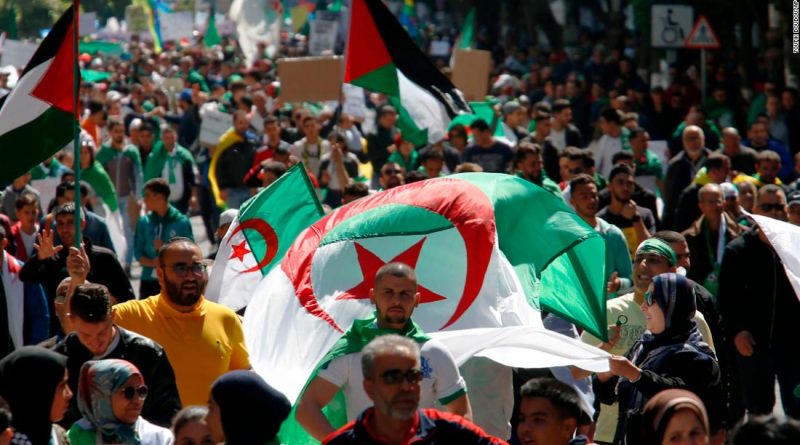A Small Victory For Algeria?
Though longtime President Abdelaziz Bouteflika has stepped down, Algeria’s democratisation is still a long ways away.
Key Actors:
- Abdelaziz Bouteflika – recently ousted President of Algeria
- Abel Gaid Salah – Chief of Staff of Algeria’s People’s National Army
On April 2nd, millions of Algerians celebrated as President Abdelaziz Bouteflika announced his resignation after twenty years in office. The passing euphoria, however, left Algerians facing an uncertain future as no clear successor emerges to guide the country to a much-desired democracy.
Who is Abdelaziz Bouteflika?
Abdelaziz Bouteflika rose to the presidency in the 1999 election, during the tail end of a devastating civil war against Islamic insurgency. He ran as the leader of the National Liberation Front, the ruling party ever since Algeria’s independence from France in 1962. The election results, stating that Bouteflika won 74% of the votes, were highly doubted by opposition parties; Bouteflika’s support from the military likely played a large part in his victory. Subsequent elections every five years achieved similarly staggering victories with a notable absence of opposition parties.
During his presidency, Bouteflika surrounded himself with a group known as “Le Pouvoir” (“The Power”), consisting of influential businessmen, generals, and politicians. In the eyes of many Algerians, his terms were characterized by inefficient government and corruption: Bouteflika was unable to effectively counter economic slowdowns due to decreased oil and gas prices, commodities which make up a third of Algeria’s GDP, early in his first term. Protests, such as Egyptian-inspired movements between 2010 and 2012, were forcibly put down by police and intelligence services.
In 2013, Bouteflika suffered a major stroke and was relegated to a wheelchair due to paralysis. Afterwards, he seldom appeared in public, leading many to question who was really ruling Algeria. Nonetheless, he won the 2014 election to serve his fourth term as President: it was only when the 82 year-old politician announced his contention for a fifth term earlier this year did popular resentment boil over.
Recent Protests
Hundreds of thousands of Algerians descended to the streets in February following Bouteflika’s announcement that he would seek re-election in April. Many, often young Algerians, sought a complete transition from the corrupt Algerian military-run establishment, known as “the system,” not just the removal of Bouteflika. In response, Bouteflika announced that he would call new elections if he won the April elections. This move was ridiculed by protesters while demonstrations increased in strength.
Bouteflika then announced that he would indefinitely postpone elections until a new democratic constitution was drafted, promising political and economic reforms. A new government was even formed. Many Algerians, however, saw this simply as an attempt to extend his fourth term. Calls for Bouteflika to resign immediately began gaining traction. Many key backers, including businessmen and fellow politicians, joined the protests.
A turning point occurred on March 26th when the army’s Chief of Staff, Lieutenant General Abdel Gaid Salah, proposed that the Constitutional Council declare Bouteflika unfit for the Presidency. In accordance to Article 102 of the Algerian Constitution, the Constitutional Council could remove the President from power with two-thirds of the votes from the upper and lower houses of parliament. Finally, on April 2nd, Bouteflika appeared on public television for the first time in six years to hand his resignation letter to the Constitutional Council.
What next?
No clear successor has appeared for Algeria. In the meantime, the interim presidency has been held by the leader of the upper house, Abdelkader Bensalah, who is required to call elections and step down within 90 days. Very little has been revealed about any potential election.
The silence on the government’s part has left many angry and willing to continue their protests, which haven’t subsided even though Bouteflika has been removed. Many Algerians seek a fully democratic and reformed nation, which they see as impossible as long as “the system” of military officials, wealthy businessmen, and corrupt politicians still exists.
This begs the question of who will lead Algeria. The military is a clear contender: after pulling the strings from behind the scenes for the past sixty years, the could continue to do so or even emerge to take the Presidency for themselves. Algeria’s opposition parties, the Socialist Forces Front, the Rally for Culture and Democracy, and various Islamic parties are fragmented from years of oppression under the Bouteflika government.
Though the situation in Algeria remains peaceful and fairly stable, any moves toward democracy look unlikely. After twenty long years under Bouteflika, it will be some time before an entrenched bureaucracy can be made to yield to a new, reformed state. For the Algerian people, their long-awaited democracy may yet require some more waiting.
Bibliography
Ailing Algeria Leader Quits amid Protests. 3 Apr. 2019. www.bbc.com, https://www.bbc.com/news/world-africa-47795108.
Algeria Army Chief Demands Bouteflika Be Declared Unfit to Rule. https://www.aljazeera.com/news/2019/03/algeria-army-chief-demands-bouteflika-declared-unfit-rule-190326144555792.html. Accessed 9 Apr. 2019.
https://www.facebook.com/profile.php?id=100009511926129. “Algeria’s Abdelaziz Bouteflika Resigns, Ending His Rule after Two Decades.” Washington Post, https://www.washingtonpost.com/world/africa/algerias-abdelaziz-bouteflika-submits-resignation-ending-two-decade-rule/2019/04/02/11d9680a-557b-11e9-814f-e2f46684196e_story.html. Accessed 9 Apr. 2019.
Nossiter, Adam. “Algeria’s Ruler, Abdelaziz Bouteflika, Agrees to Resign.” The New York Times, 1 Apr. 2019. NYTimes.com, https://www.nytimes.com/2019/04/01/world/africa/algeria-bouteflika-resign.html.

